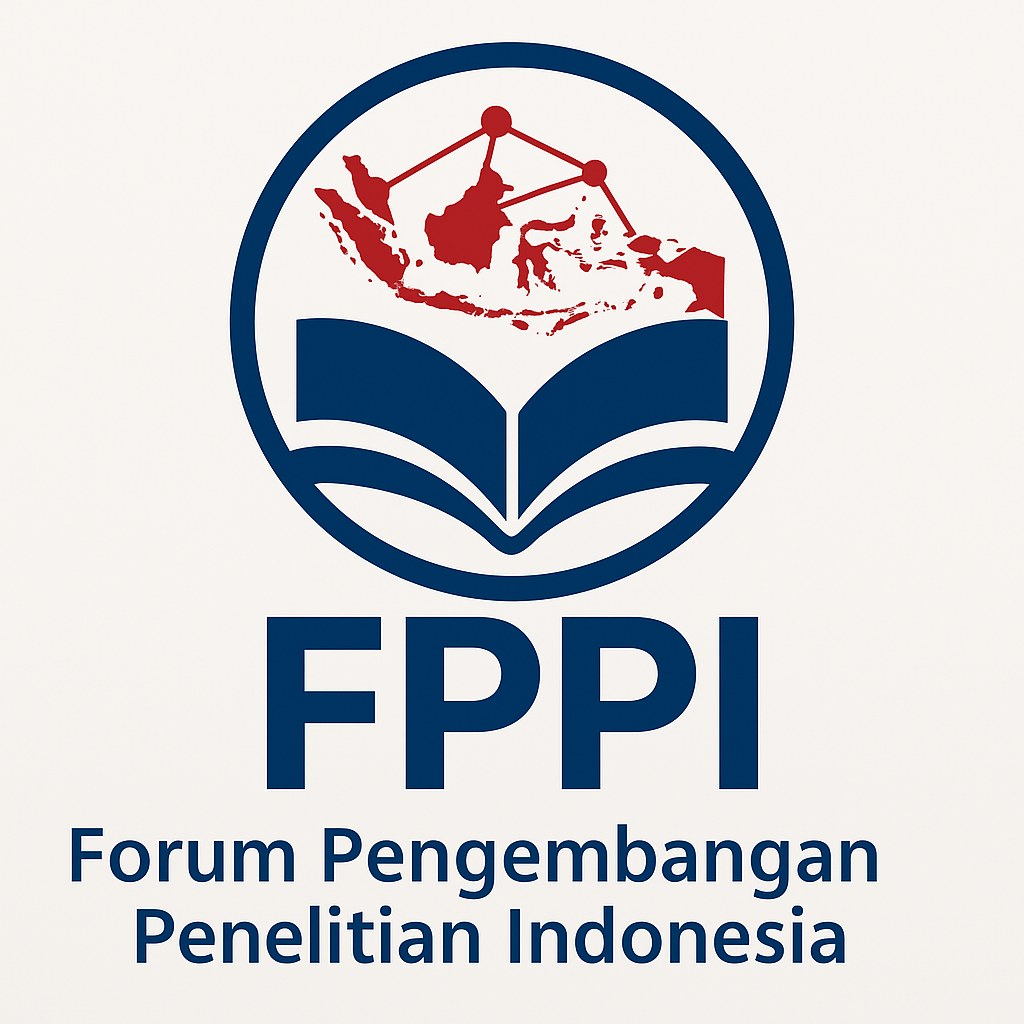Developing Teaching Materials to Enhance Critical Thinking Skills through Group Investigation in Composite Functions
Main Article Content
Abstract
This study aims to develop Group Investigation (GI)-based teaching materials to enhance the critical thinking skills of vocational high school (SMK) students in understanding and solving problems related to composition functions. Using the ADDIE model (Analysis, Design, Development, Implementation, Evaluation), the research produced teaching materials validated by subject matter experts, ensuring their quality, relevance, and alignment with curriculum objectives. Through GI stages—grouping, planning, investigation, organizing, presenting, and evaluating—students not only deepened their understanding of composition functions but also developed critical thinking, problem-solving, and teamwork skills. The findings highlight contribute to the development of innovative teaching materials and provide a foundation for transforming mathematics education into a more practical and effective discipline, particularly for vocational students.
Article Details
References
Afonso, D., & Mc Auliffe, S. (2019). Children’s Capacity for Algebraic Thinking in the Early Grades. African Journal of Research in Mathematics, Science and Technology Education, 23(2), 219–232. https://doi.org/10.1080/18117295.2019.1661661
Alsaleh, N. (2020). The effectiveness of an instructional design training program to enhance teachers’ perceived skills in solving educational problems. Academic Journal, 15(12), 751–763. https://doi.org/10.5897/ERR2020.4082
Alshammari, H. A. (2021). Assessing the Reading Skills of the Saudi Elementary Stage EFL Learners. Advances in Language and Literary Studies, 12(1), 55. https://doi.org/10.7575/aiac.alls.v.12n.1.p.55
Angraini, L. M., Kania, N., & Gürbüz, F. (2024). Students’ Proficiency in Computational Thinking Through Constructivist Learning Theory. International Journal of Mathematics and Mathematics Education, 2(1), 45–59. https://doi.org/10.56855/ijmme.v2i1.963
Brown, A. S., & Usoro, N. A. (2023). Reproductive Health Freedom and Domestic Violence in A Patriarchal Society: Some Findings in Akwa Ibom State, Nigeria. International Journal of Contemporary Studies in Education (IJ-CSE), 2(2), 127–136. https://doi.org/10.56855/ijcse.v2i2.462
Cañadas, M. C., Blanton, M., & Brizuela, B. M. (2019). Special issue on early algebraic thinking / Número especial sobre el pensamiento algebraico temprano. Infancia y Aprendizaje, 42(3), 469–478. https://doi.org/10.1080/02103702.2019.1638569
Carnine, D. (1997). Instructional Design in Mathematics for Students with Learning Disabilities. Journal of Learning Disabilities, 30(2), 130–141. https://doi.org/10.1177/002221949703000201
Chimoni, M., & Pitta-Pantazi, D. (2017). Parsing the notion of algebraic thinking within a cognitive perspective. Educational Psychology, 37(10), 1186–1205. https://doi.org/10.1080/01443410.2017.1347252
Chytrý, V., Medová, J., Říčan, J., & Škoda, J. (2020). Relation between Pupils’ Mathematical Self-Efficacy and Mathematical Problem Solving in the Context of the Teachers’ Preferred Pedagogies. Sustainability, 12(23), 10215. https://doi.org/10.3390/su122310215
Dewanti, S. S., Kartowagiran, B., Jailani, J., & Retnawati, H. (2020). Lecturers’ Experience in Assessing 21St-Century Mathematics Competency in Indonesia. Problems of Education in the 21st Century, 78(4), 500–515. https://doi.org/10.33225/pec/20.78.500
Efendi1, F. K., & Suastra, I. W. (2023). Implementation of The Independent Curriculum in Elementary Schools. International Journal of Contemporary Studies in Education (IJ-CSE), 2(2), 149–153. https://doi.org/https://doi.org/10.30880/ijcse.v2i2.363
Evans, T., & Jeong, I. (2023). Concept maps as assessment for learning in university mathematics. Educational Studies in Mathematics, 475–498. https://doi.org/10.1007/s10649-023-10209-0
Fatade, A. O., Mogari, D., & Arigbabu, A. A. (2013). Effect of Problem-Based Learning on Senior Secondary School Students’ Achievements in Further Mathematics. Acta Didactica Napocensia, 6(3), 27–44.
Garcia-Ortiz, C. E., Díaz, M. O., Rincon-Flores, E. G., & Heredia, A. S. (2024). Diagnostic Evaluation of Basic Mathematical Knowledge Carried Out on Freshman-Year Engineering Students. IEEE Global Engineering Education Conference, EDUCON. https://doi.org/10.1109/EDUCON60312.2024.10578764
Göran, W., & Britt-Marie, B. (2014). Teachers’ and Parents’ Experiences of Using Parents as Resources in Swedish Primary Education. Procedia - Social and Behavioral Sciences, 116, 1587–1593. https://doi.org/10.1016/j.sbspro.2014.01.439
Güven, İ., & Alpaslan, B. (2022). Investigation of the Effects of Interdisciplinary Science Activities on 5th Grade Students’ Creative Problem Solving and 21 st Century Skills. TOJET: The Turkish Online Journal of Educational Technology, 21(1), 80–96. https://www.oxfordlearnersdictionaries.com
Hidajat, F. A. (2021). Students Creative Thinking Profile as a High Order Thinking in the Improvement of Mathematics Learning. European Journal of Educational Research, 10(4), 1907–1918. https://doi.org/https://doi.org/10.12973/eu-jer.10.3.1247
Kania, N., Fitriani, C., & Bonyah, E. (2023). Analysis of Students’ Critical Thinking Skills Based on Prior Knowledge Mathematics. International Journal of Contemporary Studies in Education (IJ-CSE), 2(1), 49–58. https://doi.org/10.56855/ijcse.v2i1.248
Kania, N., & Kusumah, Y. S. (2025). THE MEASUREMENT OF HIGHER-ORDER THINKING SKILLS: A SYSTEMATIC LITERATURE REVIEW. Malaysian Journal of Learning and Instruction, 22(1), 97–116. https://doi.org/10.32890/mjli2025.22.1.6
Kania, N., Kusumah, Y. S., Dahlan, J. A., Nurlaelah, E., & Arifin, Z. (2024). Research Trends in Higher-Order Thinking Skills in the journal Mathematics Education in Indonesia: from Design to Data Analysis. International Journal of Mathematics and Mathematics Education, 193–206. https://doi.org/10.56855/ijmme.v2i3.1048
Kania, N., Kusumah, Y. S., Dahlan, J. A., Nurlaelah, E., Gürbüz, F., & Bonyah, E. (2024). Constructing and providing content validity evidence through the Aiken’s V index based on the experts’ judgments of the instrument to measure mathematical problem-solving skills. REID (Research and Evaluation in Education), 10(1), 64–79. https://doi.org/10.21831/reid.v10i1.71032
Kania, N., Nurhikmayati, I., & Suciawati, V. (2020). Pre-service mathematics teachers’ experiences of teaching practice in function composition. Journal of Physics: Conference Series, 1613(1). https://doi.org/10.1088/1742-6596/1613/1/012013
Kania, N., Santoso, E., & Nurbelayanti, N. (2023). Bagaimana Kemampuan Berpikir Kritis Matematis Dan Aktivitas Siswanya Pada Model Pembelajaran Berbasis Masalah? Journal on Mathematics Education Research, 3(2), 27–34.
Kania, N., Suryadi, D., Kusumah, Y. S., Dahlan, J. A., Nurlaelah, E., & Elsayed, E. E. (2024). Comparative Praxeology: Assessing High-Level Cognitive Skills in TIMSS and Indonesian National Examinations. International Journal of Applied Learning and Research in Algebra, 1(1), 25–47. https://doi.org/10.56855/algebra.v1i1.1160
Kokotsaki, D., Menzies, V., & Wiggins, A. (2016). Project-based learning: A review of the literature. Improving Schools, 19(3), 267–277. https://doi.org/10.1177/1365480216659733
Lee, J. E., Hornburg, C. B., Chan, J. Y. C., & Ottmar, E. (2022). Perceptual and Number Effects on Students’ Initial Solution Strategies in an Interactive Online Mathematics Game. Journal of Numerical Cognition, 8(1), 166–182. https://doi.org/10.5964/jnc.8323
Malalina, Putri, R. I. I., Zulkardi, & Hartono, Y. (2023). Developing mathematics teaching materials using maritime context for higher-order thinking in junior high school. Journal on Mathematics Education, 15(1), 173–190. https://doi.org/10.22342/jme.v15i1.pp173-190
Masuku, M. M., Jili, N. N., & Sabela, P. T. (2020). Assessment as A Pedagogy and Measuring Tool in Promoting Deep Learning In Institutions of Higher Learning. International Journal of Higher Education, 10(2), 274. https://doi.org/10.5430/ijhe.v10n2p274
Muryanti, S. (2023). PENINGKATAN KEMAMPUAN GURU DALAM MELAKSANAKAN EVALUASI PEMBELAJARAN BERBASIS APLIKASI GOOGLE FORM MELALUI STRATEGI. 2(2), 317–324. https://doi.org/https://doi.org/10.56855/intel.v2i2.448
Parindang, E. A., Yuspelto, N. M., Ramlan, W., & Angraini, L. M. (2024). Analisis Kesulitan Siswa SMP Dalam Menyelesaikan Soal Geometri Bangun Ruang Sisi Datar. Progressive of Cognitive and Ability, 3(3), 167–180. https://doi.org/10.56855/jpr.v3i3.1035
Reid O’Connor, B., & Norton, S. (2024). Exploring the challenges of learning quadratic equations and reflecting upon curriculum structure and implementation. Mathematics Education Research Journal, 36(1), 151–176. https://doi.org/10.1007/s13394-022-00434-w
Riccomini, P. J., Smith, G. W., Hughes, E. M., & Fries, K. M. (2015). The Language of Mathematics: The Importance of Teaching and Learning Mathematical Vocabulary. Reading and Writing Quarterly, 31(3), 235–252. https://doi.org/10.1080/10573569.2015.1030995
Rohyana, R., Nurdin, I. T., Kurniawan, R., & Sabandar, J. (2024). Analyzing Junior High School Students’ Mathematical Communication Ability and Self Esteem using Discovery Learning Model. (JIML) JOURNAL OF INNOVATIVE MATHEMATICS LEARNING, 7(4), 448–458. https://doi.org/10.22460/jiml.v7i4.23040
Saputri, A. E., & Hadi, W. (2021). Pengembangan E-Book Bermuatan High Order Thinking Skill (Hots). AKSIOMA: Jurnal Program Studi Pendidikan Matematika, 10(2), 1008. https://doi.org/10.24127/ajpm.v10i2.3578
Sibgatullin, I. R., Korzhuev, A. V., Khairullina, E. R., Sadykova, A. R., Baturina, R. V., & Chauzova, V. (2022). A Systematic Review on Algebraic Thinking in Education. Eurasia Journal of Mathematics, Science and Technology Education, 18(1), em2065. https://doi.org/10.29333/ejmste/11486
Sitepu, S., Masela, M., & Kurniawati, L. A. (2020). DESIGNING TECHNOLOGY-ASSISTED LESSON MATERIALS FOR ESP NURSING STUDENTS BY USING TPACK. Interference: Journal of Language, Literature, and Linguistics, 1(1). https://doi.org/10.26858/interference.v1i1.12812
Smith, G. (2019). ADDIE in training development for NISP-RP qualifications. In CONTE 2019 - Conference on Nuclear Training and Education: A Biennial International Forum (p. 53). https://www.scopus.com/inward/record.uri?partnerID=HzOxMe3b&scp=85064264055&origin=inward
Sulistianingsih, N., & Amir, M. F. (2021). PENERAPAN MODEL GROUP INVESTIGATION UNTUK MENINGKATKAN PERFORMA BERPIKIR KRITIS SISWA SEKOLAH DASAR PADA PEMBELAJARAN MATEMATIKA. Numeracy, 8(2), 128–142. https://doi.org/10.46244/numeracy.v8i2.1558
Szabo, Z. K., Körtesi, P., Guncaga, J., Szabo, D., & Neag, R. (2020). Examples of Problem-Solving Strategies in Mathematics Education Supporting the Sustainability of 21st-Century Skills. Sustainability, 12(23), 10113. https://doi.org/10.3390/su122310113
Walkington, C. A. (2013). Using adaptive learning technologies to personalize instruction to student interests: The impact of relevant contexts on performance and learning outcomes. Journal of Educational Psychology, 105(4), 932–945. https://doi.org/10.1037/a0031882
Walters, L. M., Green, M. R., Goldsby, D., & Parker, D. (2018). Digital Storytelling as a Problem-Solving Strategy in Mathematics Teacher Education: How Making a Math-eo Engages and Excites 21st Century Students. International Journal of Technology in Education and Science (IJTES), 2(1), 1–16.
Wijayanto, Z., Sukestiyarno, Y. L., Wijayanti, K., & Pujiastuti, E. (2023). Harnessing Sociographs to Design Discussion Groups for Mathematics Learning: A Social Network Analysis Approach. TEM Journal, 2305–2311. https://doi.org/10.18421/TEM124-41
Yabu, K. i. (2021). Designing Local Assessment Workshops and Web-Mobile Applications for Facilitating the Workshop: Based on the Schemes of Problem/Project-Based Learning (PBL) and ADDIE Model. In Lecture Notes in Computer Science (including subseries Lecture Notes in Artificial Intelligence and Lecture Notes in Bioinformatics) (Vol. 12786, pp. 114–125). https://doi.org/10.1007/978-3-030-78108-8_9
Yassir, M., Syam, H., & Nur, H. (2022). Higher Order Thinking Skills (HOTs) based Assessment for Learning: A Model for Computer Networks Learning in Vocational School. Asian Journal of Applied Sciences, 10(1). https://doi.org/10.24203/ajas.v10i1.6876
Yuliati, S. R., & Lestari, I. (2018). Higher-order thinking skill (HOTS) Analysis of Students in Solving HOTS Question in Higher Education. In Perspektif Ilmu Pendidikan (Vol. 32, Issue 2, pp. 181–188). Universitas Negeri Jakarta. https://doi.org/10.21009/pip.322.10







